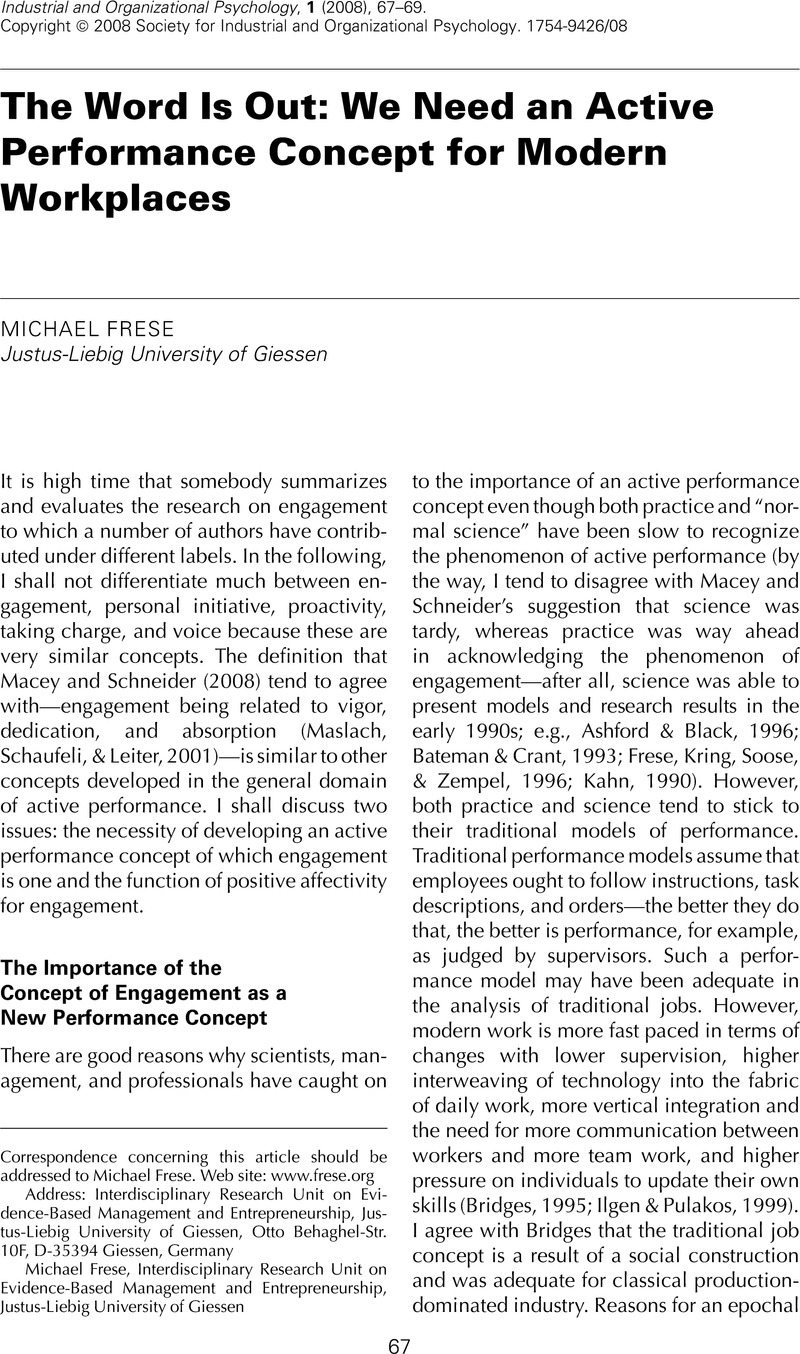Crossref Citations
This article has been cited by the following publications. This list is generated based on data provided by Crossref.
Macey, William H.
and
Schneider, Benjamin
2008.
Engaged in Engagement: We Are Delighted We Did It.
Industrial and Organizational Psychology,
Vol. 1,
Issue. 1,
p.
76.
Fay, Doris
and
Sonnentag, Sabine
2010.
A Look Back to Move Ahead: New Directions for Research on Proactive Performance and Other Discretionary Work Behaviours.
Applied Psychology,
Vol. 59,
Issue. 1,
p.
1.
Weigl, Matthias
Hornung, Severin
Parker, Sharon K.
Petru, Raluca
Glaser, Jürgen
and
Angerer, Peter
2010.
Work engagement accumulation of task, social, personal resources: A three-wave structural equation model.
Journal of Vocational Behavior,
Vol. 77,
Issue. 1,
p.
140.
Campbell, John P.
2012.
The Oxford Handbook of Organizational Psychology, Volume 1.
p.
159.
Campbell, John
2012.
The Oxford Handbook of Leadership.
p.
401.
Duyar, Ibrahim
and
Aydin, Inayet
2012.
Discretionary Behavior and Performance in Educational Organizations: The Missing Link in Educational Leadership and Management.
Vol. 13,
Issue. ,
p.
299.
Bindl, Uta K.
and
Parker, Sharon K.
2012.
Experiencing and Managing Emotions in the Workplace.
Vol. 8,
Issue. ,
p.
225.
Hauschildt, Kristina
and
Konradt, Udo
2012.
The effect of self-leadership on work role performance in teams.
Leadership,
Vol. 8,
Issue. 2,
p.
145.
Julia Claxton, Dr
Keeble-Ramsay, Diane
and
Armitage, Andrew
2014.
HRD challenges when faced by disengaged UK workers.
Journal of Workplace Learning,
Vol. 26,
Issue. 3/4,
p.
217.
Godkin, Lynn
2015.
Mid-Management, Employee Engagement, and the Generation of Reliable Sustainable Corporate Social Responsibility.
Journal of Business Ethics,
Vol. 130,
Issue. 1,
p.
15.
Duyar, Ibrahim
Ras, Nancy
and
Pearson, Carolyn L.
2015.
Analysis of teachers’ task and extra-role performance under different autonomy regimes.
International Journal of Productivity and Performance Management,
Vol. 64,
Issue. 4,
p.
499.
Campbell, John P.
and
Wiernik, Brenton M.
2015.
The Modeling and Assessment of Work Performance.
Annual Review of Organizational Psychology and Organizational Behavior,
Vol. 2,
Issue. 1,
p.
47.
Caesens, Gaëtane
Marique, Géraldine
Hanin, Dorothée
and
Stinglhamber, Florence
2016.
The relationship between perceived organizational support and proactive behaviour directed towards the organization.
European Journal of Work and Organizational Psychology,
Vol. 25,
Issue. 3,
p.
398.
Eldor, Liat
and
Harpaz, Itzhak
2016.
A process model of employee engagement: The learning climate and its relationship with extra‐role performance behaviors.
Journal of Organizational Behavior,
Vol. 37,
Issue. 2,
p.
213.
Eldor, Liat
2016.
Work Engagement.
Human Resource Development Review,
Vol. 15,
Issue. 3,
p.
317.
이동섭
조예슬
and
최용득
2017.
Proactive Personality and Proactive Behavior: The Role of Ethical Leadership.
Korean Journal of Business Ethics,
Vol. 17,
Issue. 2,
p.
63.
Cha, JaeMin
Kim, SeungHyun “James”
Beck, Jeff
and
Knutson, Bonnie J.
2017.
Predictors of Career Success Among Lodging Revenue Managers: Investigating Roles of Proactive Work Behaviors.
International Journal of Hospitality & Tourism Administration,
Vol. 18,
Issue. 4,
p.
474.
Jauhari, Hemang
Singh, Shailendra
and
Kumar, Manish
2017.
How does transformational leadership influence proactive customer service behavior of frontline service employees? Examining the mediating roles of psychological empowerment and affective commitment.
Journal of Enterprise Information Management,
Vol. 30,
Issue. 1,
p.
30.
Hu, Yixin
Wu, Xiao
Zong, Zhaobiao
Xiao, Yilin
Maguire, Phil
Qu, Fangzheng
Wei, Jing
and
Wang, Dawei
2018.
Authentic Leadership and Proactive Behavior: The Role of Psychological Capital and Compassion at Work.
Frontiers in Psychology,
Vol. 9,
Issue. ,
Rothausen, Teresa J.
and
Henderson, Kevin E.
2019.
Meaning-Based Job-Related Well-being: Exploring a Meaningful Work Conceptualization of Job Satisfaction.
Journal of Business and Psychology,
Vol. 34,
Issue. 3,
p.
357.



